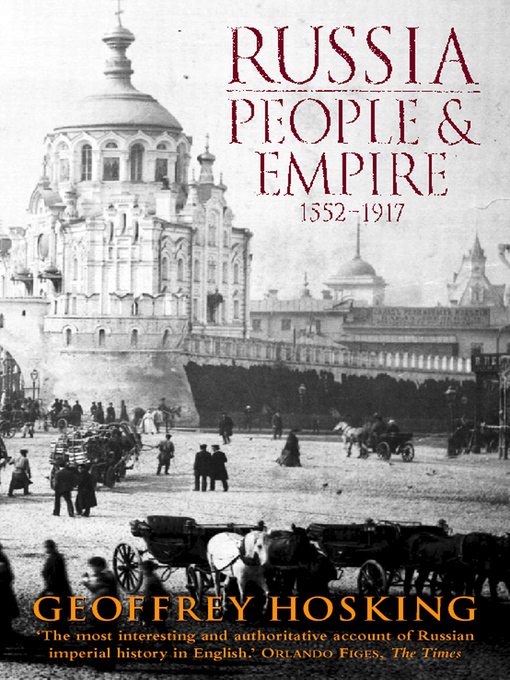-
Creators
-
Publisher
-
Release date
July 15, 2010 -
Formats
-
OverDrive Read
- ISBN: 9780007396245
-
EPUB ebook
- ISBN: 9780007396245
- File size: 1350 KB
-
-
Languages
- English
-
Reviews
-
Publisher's Weekly
April 28, 1997
One of the author's earlier books, The First Socialist Society, is a rare example of sound academic history made popular. This monograph, while a tour de force from a foremost practitioner of Russian history, does not meet that standard. Hosking offers an innovative reinterpretation of Russian imperial history, arguing that the concept of nation-building should replace autocracy and backwardness, the two themes most often used to interpret Russian history. The subtitle of the book is the key here: the author believes that the desire for empire hindered the Russians' ability to form a nation. Demonstrating a thorough knowledge of Western and Russian sources, he covers the main topics in imperial Russian history: the rise of the Russian state, the peasantry, imperial expansion, the church, the army, the nobility and more. A professor of Russian history at the University of London's School of Slavonic & East European Studies, Hosking imaginatively connects specific movements and general patterns to buttress his argument--just one example is his nuanced articulation of the long-term importance of the Old Believers, those members of Russian society who resisted 17th-century religious reforms. The Old Believers, he explains, "marked the opening of a radical split in Russian consciousness, when large numbers of conservative and patriotic Russians became alienated from the imperial state." The book, however, is too dense and confusing--half is arranged thematically, half chronologically--for the general reader. There's plenty to chew on here--one only wishes the author had presented it in a more digestible package.
-
Formats
- OverDrive Read
- EPUB ebook
subjects
Languages
- English
Loading
Why is availability limited?
×Availability can change throughout the month based on the library's budget. You can still place a hold on the title, and your hold will be automatically filled as soon as the title is available again.
The Kindle Book format for this title is not supported on:
×Read-along ebook
×The OverDrive Read format of this ebook has professional narration that plays while you read in your browser. Learn more here.

